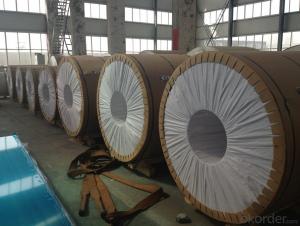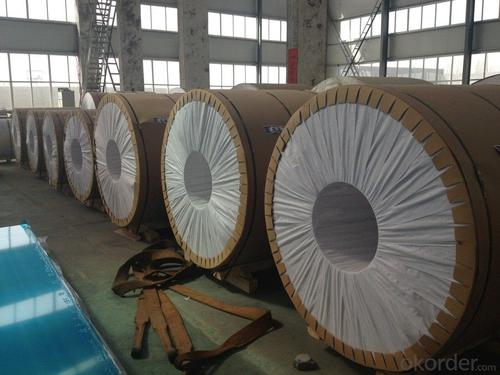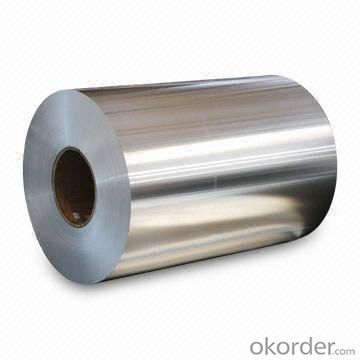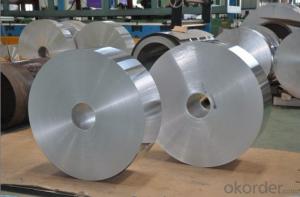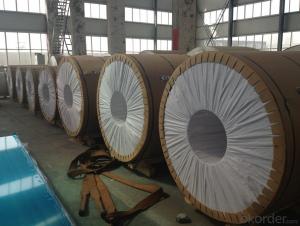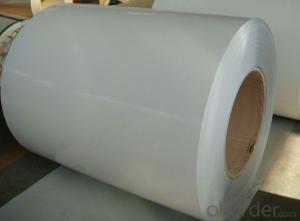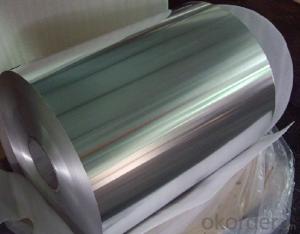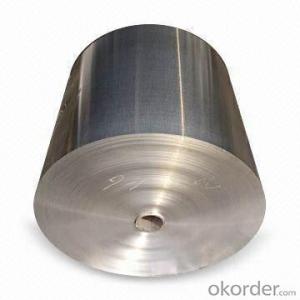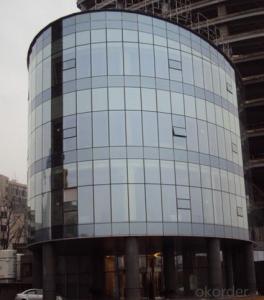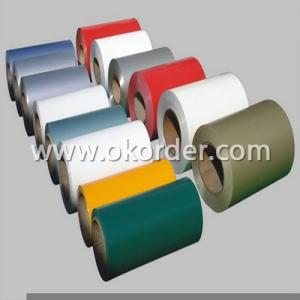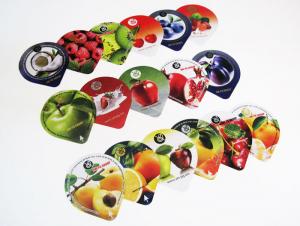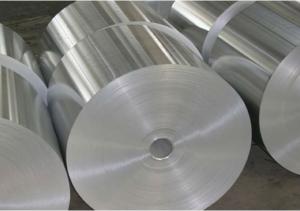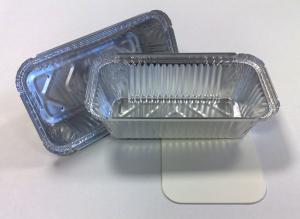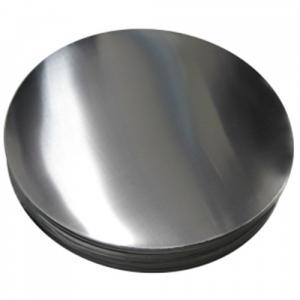Aluminum Cold Rolled Coil Thick Foil Made in China
- Loading Port:
- Shanghai
- Payment Terms:
- TT OR LC
- Min Order Qty:
- 5 m.t.
- Supply Capability:
- 100000 m.t./month
OKorder Service Pledge
OKorder Financial Service
You Might Also Like
Specification
Product Description
Commodity: Aluminum coil jumbo rolls
Alloy: 1050/1060/1100/1200/3003/3004/3005/3105/5005/5052/5754/5083/6061/8011
Temper: O, H12,H14,H16,H18,H22,H24,H32,H112,T6
Gauge: 0.2mm-8mm
CC and DC material with higher tensile strength and bigger elongation
Company Information
CNBM is in aluminum foil, coil, sheet, plate for more than 10 years, thus we have rich product, technology and market experiences. With the world’s top aluminum processing equipments, experienced technical staff, cooperative and professional sales team, and the enterprise concept of responsibility and sharing, we have been widely focused since the day set up, and has gained high praise from customers home and abroad until now.
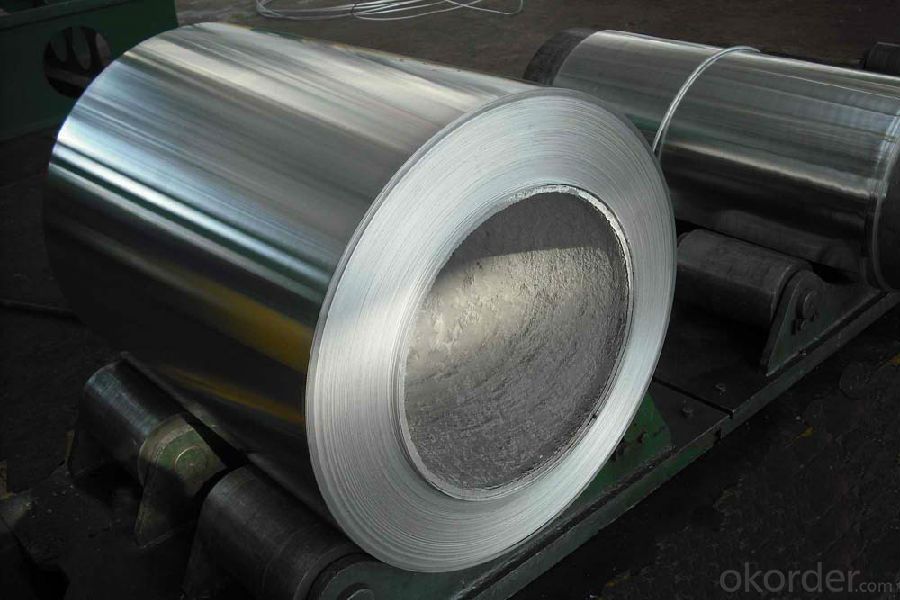
We specially produce and sell all kinds of aluminum foil, coil, sheet and plate with different sizes and applications. For Foil product, the main gauge ranged from 0.006mic to 0.10mm, and width ranged from 200mm to 2000mm. Alloys are 1235/ 1050/1060/1200/8079/8011/8006 etc, and ID is 76mm, 152mm. The main application includes flexible package, cigarette foil, golden card foil, pharmaceutical foil, household foil, container foil, air conditioner foil, lid foil, beer mark foil etc. We also can supply aluminum coil, strip, sheet and plate in alloy of 1000 series, 3000 series, 5000 series, 6000 series and 8000 series etc.
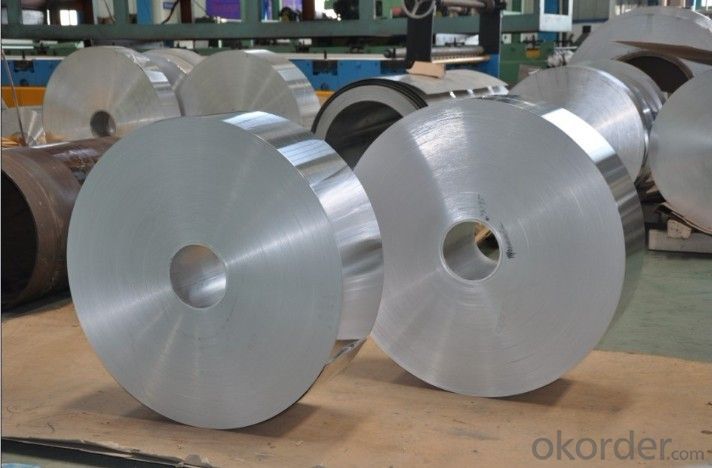
CNBM has passed ISO9001 and ISO14001 successfully, and also approved by American Food and Drug Administration (FDA). By the good product quality and professional service, we have set up a complete sales network. Until now, our products has exported to more than 20 countries and regions including Europe, USA, Canada, Brazil, Southeast Asia and middle east etc.
Product Description of Coil Aluminum
Aluminum Coil - Specifications
Manufactured in compliance with the main international specifications and standards,including: Aluminum Association, ASTM, EN, and DIN.
We can also manufacture in compliance with other international standards including:ASME, SAE, AMS, AWS, FED, MIL, QQ, ISO, BS, AFNOR, JIS and GOST.
Aluminum Coil - Tolerances
- Manufactured in compliance with the main international specification and standards.
- Tighter tolerances are available upon request.
Aluminum Coil - Surface Conditions
- Mill, Matte, Bright and Brushed
- Cleaning and degreasing
- Surface oiling
- Custom surface conditions available upon request.
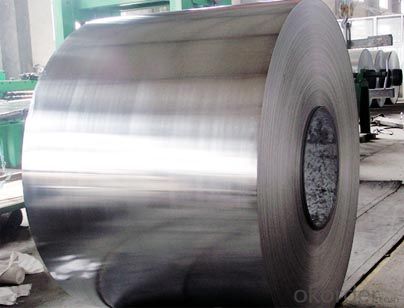
- Q: This question asks about the various uses of aluminum alloys within the construction industry.
- <p>Aluminum alloys are widely used in construction due to their strength, light weight, and corrosion resistance. Some applications include: 1) Structural framing for buildings and bridges, leveraging their high strength-to-weight ratio. 2) Window and door frames, benefiting from their durability and low maintenance. 3) Roofing materials, as they are lightweight and resistant to weathering. 4) Facade cladding, for aesthetic appeal and resistance to environmental damage. 5) Electrical wiring and conduits, due to their excellent electrical conductivity and safety. 6) Scaffolding, as they are lightweight and easy to assemble. 7) Solar panel frames, taking advantage of their lightweight and recyclable properties. These applications highlight aluminum alloys' versatility and importance in modern construction.</p>
- Q: This question asks for common applications of aluminum in everyday life.
- <p>Aluminum is widely used in daily life due to its lightweight, durability, and resistance to corrosion. It is commonly found in beverage cans, food packaging, and cookware. Aluminum is also used in construction for window frames, doors, and roofing. It is a key material in the manufacturing of vehicles, including cars, airplanes, and bicycles, due to its strength-to-weight ratio. In electronics, aluminum is used in heat sinks and wiring. Additionally, it is used in everyday items like foil, furniture, and sports equipment. Its versatility makes aluminum an essential material in many aspects of modern life.</p>
- Q: This question asks for methods to protect aluminum from corrosion.
- <p>Aluminum corrosion can be prevented through several methods. One common approach is anodizing, which involves applying a protective oxide layer to the aluminum surface. This process enhances the metal's resistance to corrosion. Another method is using protective coatings such as paints or enamels that act as a barrier against corrosive elements. Cathodic protection, where aluminum is connected to a more easily corroded metal, can also be used. Additionally, ensuring proper design and avoiding contact with aggressive chemicals can minimize corrosion. Regular maintenance and inspection can help detect and address corrosion issues early.</p>
- Q: Explain the impact of high-temperature cooking on aluminum cookware.
- <p>High-temperature cooking can have detrimental effects on aluminum cookware. When exposed to high heat, aluminum can react with acidic or alkaline foods, potentially causing the release of aluminum particles into the food. This can lead to a change in the taste and color of the food, and over time, it may also lead to the degradation of the cookware's surface, causing it to become discolored or pitted. Additionally, there are health concerns related to the ingestion of aluminum, although these are still a subject of debate among scientists. It's generally recommended to use aluminum cookware on low to medium heat to preserve both the quality of the food and the longevity of the cookware.</p>
- Q: This question asks for various applications or purposes that can be served by using aluminum scrap material.
- <p>Aluminum scrap can be repurposed in numerous ways due to its recyclability and durability. Some alternative uses include manufacturing new aluminum products, such as cans, foil, and automotive parts. It can also be used in construction for materials like window frames and roofing. Additionally, aluminum scrap is utilized in the production of everyday items like bicycles, furniture, and even in some types of cookware. Furthermore, it can be employed in the aerospace industry for aircraft parts and in the electronics industry for components. Recycling aluminum scrap not only conserves resources but also reduces energy consumption and environmental impact.</p>
- Q: Jiangsu in addition to the 10000 aluminum factory, there are no other aluminum factory?
- Jiangyin Xinyu company specializing in the production of various types of building Aluminum Alloy industrial profiles, A Well-Known Trademark in China, national inspection, Jiangsu famous brand, my ID address after the two to 52 is my mobile phone number, welcome to contact with us, thank you!
- Q: Is it possible to develop allergies from exposure to aluminum found in food packaging materials?
- <p>While aluminum is commonly used in food packaging materials, the risk of allergic reactions to aluminum is generally low for most people. Aluminum is not a known allergen, and exposure through packaging is typically minimal. However, individuals with a rare condition called contact dermatitis may experience skin irritation from aluminum. For the general population, the risk of allergic reactions due to aluminum in food packaging is negligible. It's always important to monitor any unusual reactions and consult a healthcare professional if concerned.</p>
- Q: Describe the chemical reaction that occurs when aluminum reacts with an acid.
- <p>When aluminum reacts with an acid, it undergoes a single displacement reaction. The general reaction can be represented as: 2Al + 6HCl 鈫?2AlCl鈧?+ 3H鈧? In this reaction, aluminum (Al) displaces hydrogen (H) from the hydrochloric acid (HCl), forming aluminum chloride (AlCl鈧? and hydrogen gas (H鈧?. The aluminum atoms lose three electrons each to form Al鲁鈦?ions, while the hydrogen ions (H鈦? from the acid gain electrons to form hydrogen gas. This reaction is exothermic, releasing heat and often producing bubbles of hydrogen gas.</p>
- Q: Is it possible to utilize recycled plastic or paper for manufacturing new products instead of sourcing new materials?
- <p>Yes, recycled plastic and paper can be used to create new products, reducing the need for new materials. This process not only conserves natural resources but also decreases waste in landfills. Recycled paper can be used to make new paper products, packaging, and even some types of construction materials. Similarly, recycled plastics can be repurposed into various products such as clothing, furniture, and new plastic items. However, it's important to note that the quality of recycled materials may vary, and not all plastics or paper products can be recycled effectively. The recycling process also requires energy, so it's crucial to balance the environmental benefits with the energy costs and potential for contamination during recycling.</p>
- Q: Is it possible to utilize aluminum as a material for food containers?
- <p>Yes, aluminum is commonly used to make food containers due to its lightweight, durability, and good thermal conductivity. It's important to note that aluminum containers are often coated or lined with materials like plastic or enamel to prevent direct contact with food, as aluminum can react with acidic or alkaline foods and potentially leach into the food. Additionally, while aluminum is generally safe, there are concerns about its long-term health effects, so its use in food containers is regulated to ensure safety.</p>
Send your message to us
Aluminum Cold Rolled Coil Thick Foil Made in China
- Loading Port:
- Shanghai
- Payment Terms:
- TT OR LC
- Min Order Qty:
- 5 m.t.
- Supply Capability:
- 100000 m.t./month
OKorder Service Pledge
OKorder Financial Service
Similar products
Hot products
Hot Searches
Related keywords
